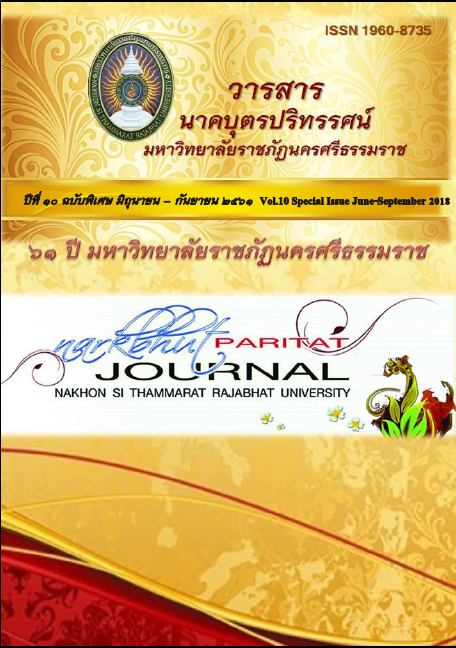การส่งเสริมสมรรถนะการสอนคณิตศาสตร์ของครูด้วยการศึกษาชั้นเรียนและวิธีการแบบเปิด Enhancing Teacher Competency in Mathematics Teaching with Lesson Study and Open Approach
Main Article Content
บทคัดย่อ
การพัฒนาผู้เรียนในศตวรรษที่ 21 นั้น จำเป็นต้องใช้วิธีการสอนที่เน้นการฝึกปฏิบัติและการจัดประสบการณ์ให้ผู้เรียนได้เรียนรู้จริง แต่ปัจจุบันรูปแบบการสอนโดยเฉพาะในชั้นเรียนคณิตศาสตร์ยังไม่สามารถทำหน้าที่ดังกล่าวได้อย่างเต็มที่ ทั้งนี้เนื่องมาจากสาเหตุหลักอย่างหนึ่งคือการปฏิบัติการสอนในชั้นเรียนของครู ดังนั้นการวิจัยนี้จึงมีเป้าหมายเพื่อ 1) ประเมินสมรรถนะการสอนคณิตศาสตร์ของครู และ 2) หาแนวทางส่งเสริมสมรรถนะการสอนคณิตศาสตร์ของครู เพื่อการพัฒนาผู้เรียนในศตวรรษที่ 21 โดยใช้การศึกษาชั้นเรียน (Lesson Study) และวิธีการแบบเปิด (Open Approach) กลุ่มเป้าหมาย คือ ครูผู้สอนรายวิชาคณิตศาสตร์ระดับชั้น ป.1 , ป.2 และ ป.3 จำนวน 3 คน และนักเรียนชั้น ป.1 , ป.2 และ ป.3 จำนวน 84 คน โรงเรียนเพชรผดุงเวียงไชย อำเภอไชยา จังหวัด สุราษฎร์ธานี ปีการศึกษา 2560 ที่เข้าร่วมโครงการด้วยความสมัครใจ การวิจัยครั้งนี้ใช้ระเบียบวิธีวิจัยแบบผสมผสาน (Mixed Method) เครื่องมือที่ใช้ในการวิจัยประกอบด้วย บันทึกวีดีทัศน์การสอน แผนการสอน แบบบันทึกการสังเกตชั้นเรียน แบบสะท้อนผลชั้นเรียน การสัมภาษณ์ครูและนักเรียน และแบบประเมินสมรรถนะการสอน วิเคราะห์ข้อมูลโดยอาศัยกรอบการวิเคราะห์สมรรถนะการสอนที่ผู้วิจัยสังเคราะห์ขึ้นจากแนวคิดของ พิมพันธ์ เดชะคุปต์ และ พเยาว์ ยินดีสุข (2558) การวิเคราะห์ข้อมูลใช้การบรรยายเชิงวิเคราะห์ (Descript Analysis) และสถิติที่ใช้ คือ ค่าเฉลี่ย และร้อยละ
ผลการประเมินสมรรถนะการสอนคณิตศาสตร์ของครู พบว่า ครูกรณีศึกษาทั้ง 3 คน มีค่าเฉลี่ยของสมรรถนะการสอนคณิตศาสตร์ก่อนเข้าร่วมโครงการในทุกด้าน คือ 2.79 ซึ่งอยู่ในระดับปานกลาง และน้อยกว่าค่าเฉลี่ยของสมรรถนะการสอนคณิตศาสตร์หลังเข้าร่วมโครงการในทุกด้าน คือ 4.19 ซึ่งอยู่ในระดับมาก ทั้งนี้เนื่องมาจากการรับฟังแนวคิดและนำไปปฏิบัติในช่วงแรกนั้นครูอาจจะยังขาดประสบการณ์และมีความเข้าใจที่ไม่ชัดเจนทั้งในแง่ของการใช้หนังสือเรียน การตีความ และการวางเป้าหมายของบทเรียน แต่เมื่อมีการนำแนวคิดไปสู่การปฏิบัติในชั้นเรียนจริง ครูได้เห็นปัญหารวมถึงแนวคิดของนักเรียนที่เกิดขึ้นในชั้นเรียน และนำสิ่งเหล่านั้นกลับมาพิจารณา แก้ไข ปรับปรุงไปใช้ในครั้งต่อๆ ไป จึงช่วยให้สมรรถนะการสอนคณิตศาสตร์ของครูไม่ว่าจะเป็นด้านการวางแผนการสอน ด้านการจัดกิจกรรมการเรียนรู้ และด้านการประเมิน สูงขึ้นกว่าช่วงแรกๆ ของการเข้าร่วมโครงการ
ผลการวิเคราะห์แนวทางส่งเสริมสมรรถนะการสอนคณิตศาสตร์ของครู สามารถสรุปเป็นแนวทางเพื่อการพัฒนาสมรรถนะการสอนคณิตศาสตร์ของครู ได้ 3 แนวทางหลักๆ ดังนี้ 1) การให้แนวคิดเกี่ยวกับนวัตกรรมและแนวทางการนำนวัตกรรมไปใช้ในระดับชั้นเรียน เช่น การจัดอบรมเชิงปฏิบัติการ การวิเคราะห์และการใช้หนังสือเรียน การเปิดชั้นเรียน เป็นต้น 2) การนำนวัตกรรมไปปฏิบัติในชั้นเรียนจริง ติดตามและมีการปรับปรุงการปฏิบัติอย่างต่อเนื่องและสม่ำเสมอ และ 3) การสร้างทีมทำงานภาคปฏิบัติทั้งในส่วนของการวางแผน การสังเกต และการสะท้อนผล เพื่อร่วมกันเสนอมุมมองที่หลากหลายในการพัฒนาชั้นเรียน ซึ่งแนวทางต่าง ๆ เหล่านี้มีส่วนช่วยให้ครูเกิดการพัฒนาสมรรถนะการสอนคณิตศาสตร์ทั้งในแง่การออกแบบการจัดกิจกรรมการเรียนรู้ ซึ่งครูต้องเข้าใจวิธีการใช้หนังสือเรียน การตีความ และการวางเป้าหมายของบทเรียน รวมถึงการคาดการณ์แนวคิดของผู้เรียน เมื่อนำกิจกรรมลงสู่การปฏิบัติในห้องเรียนจริง ครูต้องมีมุมมองและเป้าหมายที่ชัดเจนในการดูชั้นเรียน รวมถึงต้องมีทักษะการสังเกตวิธีการคิด การแก้ปัญหา และความยุ่งยากของผู้เรียนในการแก้ปัญหา เพื่อนำมาเป็นประเด็นในการอภิปรายและแนวทางในการพัฒนากิจกรรมการเรียนรู้ในครั้งต่อไป
Article Details
เอกสารอ้างอิง
Chai Podhisita. (2009). Art and Science in qualitative research. Bangkok: Amarin Printing & Publishing. (in Thai)
Chaiwat Sutirat (2014). Art of Teaching in the 21st Century. Bangkok: Veepint. (in Thai)
Sato Manobu. (2016). School reform: The concept of "learning community" and the application of theory to practice. Nonthaburi: printing company. (in Thai)
Tisana Khamanee. (2010). The Science of Teaching: Knowledge for an Effective Learning. Bangkok
: Chulalongkorn University Press. (in Thai)
Thanya kadroon. (2013). Changing teachers’ values about teaching mathematics in pilot school
implementing Lesson study and Open Approach. Doctor of philosophy thesis in Mathematics Education. Graduate school, Khon Kaen University. (in Thai)
Pimphan Dejakupt and Payao Yindeesook. (2015). Learning Management in the 21st Century.
(2nd edition). Bangkok: Chulalongkorn University Press. (in Thai)
Vayukhon Robsuk. (2007). A study of the roles of teachers in instructional engagement with students’ mathematical thinking in mathematics classroom using the Open Approach method. Master thesis in Mathematics Education. Graduate school, Khon Kaen University. (in Thai)
Suthat Aka. (2016). The teacher of the 21st century. (3rd edition). Bangkok: The Kor Phol Company (1996) Limited. (in Thai)
Suphang Juntawanich. (2014). Qualitative Research Methods. (22nd. Edition). Bangkok: Chulalongkorn University Publishing. (in Thai)
Aumporn Makanong. (2003). Mathematics: Teaching and Learning. Bangkok: Chulalongkorn University Publishing. (in Thai)
Becker, J & Shimada, S. (1997). The Open – Ended Approach: A New Proposal for Teaching Mathematics. [n.p.]: NCTM.
Brannen, J. (1992). Mixing Methods: qualitative and quantitative research. Aldershort: Gower.
Fernandez, C. & Yoshida, M. (2004). Lesson Study: A Japanese Approach to Improving Mathematics Teaching and Learning. London: Lawrence Erlbaum Associates.
Huang R., Su H., & Xu S.(2014). Developing teachers’ and teaching researchers’ professional competence in mathematics through Chinese Lesson Study. ZDM Mathematics Education (2014) 46:239–251
Inprasitha, M. (2010). One Feature of Adaptive Lesson Study in Thailand: Designing
Learning Unit. In CheongSoo, C., SangGu, L., & YoungHan, C. (Eds.). Proceedings of the 45th Korean National Meeting of Mathematics Education (pp.193-206). Korea: Dongkook University Gyeongju Korean Society of Mathematics Education.
Isoda, M. (2010). The Principles for Problem Solving Approach and Open Approach: As a product of Lesson Study. Proceedings of International Conference on Educational Research (ICER) 2010 Learning Communities for Sustainable Development, September 10-11, 2010. Faculty of Education, Khon Kaen University, Thailand.
Lewis, C. & Hurd, J. (2011). Lesson Study step by Step: How Teacher Learning Communities Improve Instruction. Heinemann: Portsmouth.
Loipha, S. & Inprasitha, M. (2004) Professional Development to Promoting Mathematics Learning. KKU Journal of Mathematics Education, 1(January - June), 18 - 28.
Nohda, N. (2000). Teaching by Open-Approach Method in Japanese Mathematics Classroom. Proceedings of the Conference of the International Group for the Psychology of Mathematics Education (PME), July 23-27, 2000. Hiroshima, Japan.
Shimizu, S. (2006). Professional Development through Lesson Study: A Japanese Case. Paper
presented at APEC International Symposium on Innovation and Good Practice for Teaching
and Learning Mathematics through Lesson Study. Khon Kaen Session.
Stigler, J. W., & Hiebert, J. (1999). Teaching gap: Best ideas from the world’s teachers for improving Education in the classroom. New York: Free Press.


